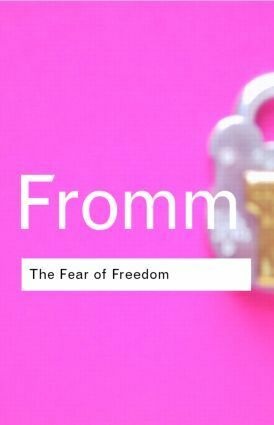
| Verlag | Taylor & Francis |
| Auflage | 2001 |
| Seiten | 272 |
| Format | 15,0 x 20,0 x 2,1 cm |
| Gewicht | 294 g |
| Artikeltyp | Englisches Buch |
| Reihe | Routledge Classics |
| ISBN-10 | 0415253888 |
| EAN | 9780415253888 |
| Bestell-Nr | 41525388EA |
Fromm sees right to the heart of our contradictory needs for community and for freedom like no other writer before or since. In Fear of Freedom, Fromm warns that the price of community is indeed high, and it is the individual who pays.
Erich Fromm sees right to the heart of our contradictory needs for community and for freedom like no other writer before or since. In Fear of Freedom, Fromm warns that the price of community is indeed high, and it is the individual who pays. Fascism and authoritarianism may seem like receding shadows for some, but are cruel realities for many. Erich Fromm leaves a valuable and original legacy to his readers - a vastly increased understanding of the human character in relation to society. At the beginning of the 21st century, it is more important than ever to be aware of his powerful message. Listen, and take heed.
Inhaltsverzeichnis:
Foreword
Freedom--A Psychological Problem?
The Emergence of the Individual and the Ambiguity of Freedom
Freedom in the Age of the Reformation
Medieval Background and the Renaissance
The Period of the Reformation
The Two Aspects of Freedom for Modern Man
Mechanisms of Escape
Authoritarianism
Destructiveness
Automaton Conformity
Psychology of Nazism
Freedom and Democracy
The Illusion of Individuality
Freedom and Spontaneity
Appendix: Character and the Social Process
Index
Rezension:
"Erich Fromm speaks with wisdom, compassion, learning and insight into the problems of individuals trapped in a social world that is needlessly cruel and hostile." - Noam Chomsky
"He has enriched our understanding of man in humanity, compassion and love." - Sunday Times
"The Fear of Freedom examined the plight of man in the post existentialist world; it saw man as cut off from the homely security of the medieval paradise, driven by loneliness and fear to seek solutions to his predicament in the shelter of political tyrannies. Fromm's was a subtle exploration of the "negative aspect of freedom", a situation in which he saw modern man as alleviating his unbearable powerlessness and isolation only by morbid activity." - The Times
"Dr Fromm has attacked his subject in a fresh and original way and thrown a flood of illumination on it." - Times Educational Supplement
